Events and Activities
DIJ Newsletter Spring 2023
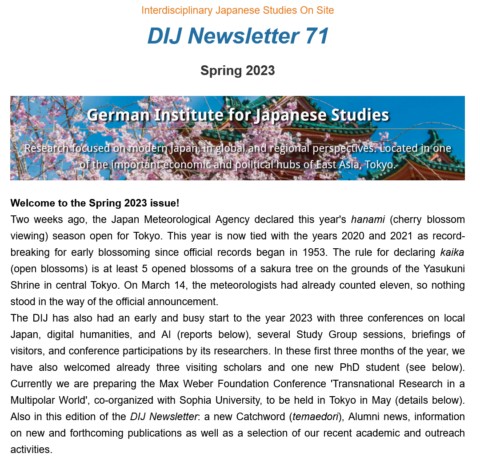
The spring issue of our DIJ Newsletter provides up-to-date insights into our research and publication activities, looks back to recent DIJ events, introduces new researchers, and gives updates on our outreach as well as on DIJ alumni activities. We hope you will enjoy exploring this new edition of the DIJ Newsletter. If you haven’t done so yet, you can subscribe to receive our Newsletters directly to your inbox. The full issues and subscription form are available here.
Joint book exhibition on Mori Ōgai
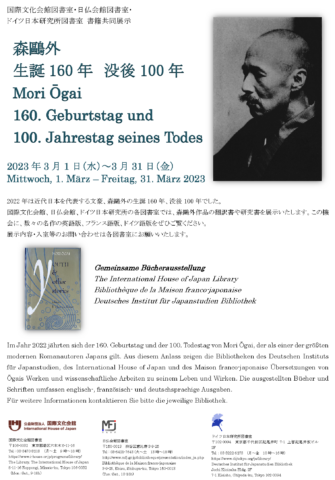
The year 2022 marked the 160th anniversary of the birth and 100th anniversary of the death of Mori Ōgai, who is considered one of the greatest modern Japanese novelists. To celebrate both anniversaries, the International House of Japan Library, the Bibliothèque de la Maison franco-japonaise, and the Deutsches Institut für Japanstudien Bibliothek are displaying translations of Ōgai’s works and critical studies in English, French, and German. For more information on opening times and entry regulations, please contact our library. Details here
Franz Waldenberger to discuss Japan’s productivity puzzle at MFJ lunch webinar
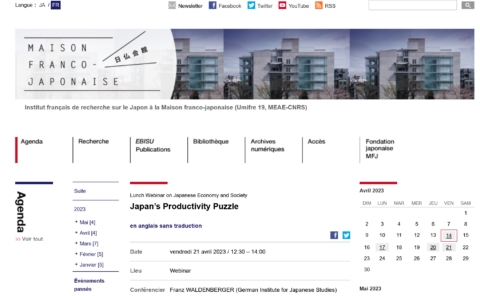
Given its rapidly aging society, Japan will need to increase labour productivity in order to sustain its current income levels. Value added per hour worked has been increasing over the last 30 years in Japan, but it remains very low in comparison to other OECD countries. In 2021, it was below 60% of the US level. This is rather surprising given Japan’s excellent resource conditions: a high education level of its workforce; high investment in research and development; and relative abundance of capital. In this online presentation, DIJ director Franz Waldenberger will try to resolve Japan’s productivity puzzle and discuss how productivity could be increased. His talk is part of the Lunch Webinar on Japanese Economy and Society organized by the French Research Institute on Japan at the Maison franco-japonaise (MFJ). It takes place on April 21, from 12.30 to 14h. Details and registration here
Celia Spoden invited commentator at University of Tokyo’s ‘Robot (inter)faces’ panel discussion

DIJ social scientist Celia Spoden will participate in the event ‘Robot (inter)faces: Understanding and mapping robot/avatar faces’, hosted by the University of Tokyo’s Institute for Future Initiatives as invited commentator and panelist. Adopting media philosophy, ethnographical approaches and STS to robots, the event will explore the features and situated performances of robot and avatar’s faces. It takes place on April 11 at the University’s Ito International Research Center, is co-hosted by the JST Moonshot R&D Program “Cybernetic being” Project and supported by the Australia-Japan Foundation. Details and registration information here
Discussion Paper on Japan’s monetary policy co-authored by Markus Heckel
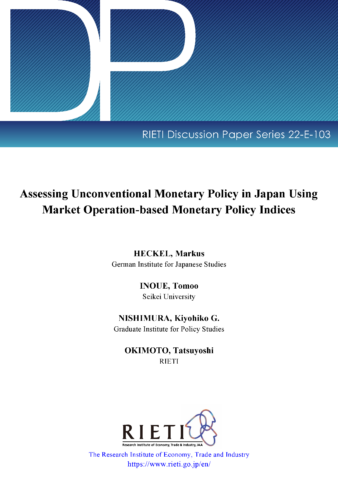
DIJ economist Markus Heckel has co-authored the discussion paper Assessing Unconventional Monetary Policy in Japan Using Market Operation-based Monetary Policy Indices which was published in the RIETI Discussion Paper series in November 2022. Together with his co-authors Tomoo Inoue (Seikei University), Kiyohiko G. Nishimura (Graduate Institute for Policy Studies), and Tatsuyoshi Okimoto (Research Institute of Economy, Trade and Industry, RIETI), Markus analyzes the effectiveness of unconventional monetary policy (UMP) from 2002 to 2019. Their study quantifies the effect of UMP carried out by open market operations on the macroeconomy in Japan based on four market operation-based monetary policy indices. The results indicate that there were three distinctive regimes with different policy impacts and that UMP carried out using market operations was the most effective in the second regime (mid-2008 to mid-2016). The discussion paper is freely available for download here
DIJ talk discusses regulations and future of Artificial Intelligence

How positive or negative is the future of Artificial Intelligence (AI)? Despite its potential, most people are worried about the impact AI may have on their lives, including discrimination and unemployment. This talk will present a novel approach to help improve regulation of AI to become more inclusive and to avoid future harms from emerging technologies. To this end it utilizes arts-based research methods such as speculative design and Science Fiction prototyping. Its use in other disciplines has already shown its potential in helping policy discussions to become more inclusive towards underrepresented stakeholder communities and alternative perspectives. After presenting her research and recent findings from speculative design workshops in Japan and Taiwan, the speaker will invite the audience to actively take part in a speculative design exercise to experience how thinking about the future may help us make better decisions in the present. Details and registration here
Online DIJ talk by Chika Watanabe on Patchwork Ethnography
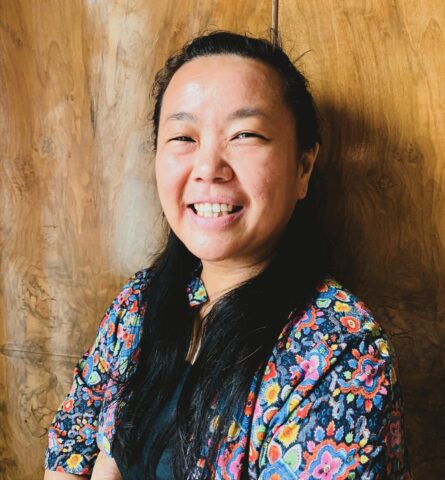
Against the background of neoliberal university labour conditions, expectations of work-life balance, and environmental concerns, long-term fieldwork is becoming difficult for researchers using ethnographic methods. Gökçe Günel and Chika Watanabe propose ‘patchwork ethnography’ to consolidate the innovations that are already happening in ethnographic research out of necessity—to balance family and research, for example—but that remain black boxed. Patchwork ethnography begins from the acknowledgement that recombinations of ‘home’ and ‘field’ have perhaps always existed in fieldwork practices. However, the interpenetration of the personal with the professional is often deemed illegitimate in research practices. This talk presents patchwork ethnography as a provocation to open spaces of honest conversation so that models other than uninterrupted fieldwork can become recognized methodological approaches, while still upholding the importance of long-term commitments, language proficiency, and contextual knowledge. Details and registration here
Chika Watanabe, University of Manchester
Special journal issue on Abe’s legacy for Southeast Asian relations

The latest volume of the open-access Kyoto Review of Southeast Asia investigates Shinzo Abe’s legacy for the future of Japanese-Southeast Asian relations. It was guest edited by DIJ historian David M. Malitz who also contributed the article “Japanese-Thai Relations through Two Coups: Back to Business”. In it, David traces the positive development of Japanese-Thai relations under Abe’s government (2006-07, 2012-20) during times of political instability in Thailand. The special issue also contains articles on Shinzo Abe’s military legacy for Indonesia (Bima Prawira Utama), Philippine-Japan relations (Karl Ian Cheng Chua), Japan-Singapore relations (Kei Koga), and Vietnam-Japan relations (Hoang Minh Hang). All articles can be accessed freely via the journal’s website here





 Open Access
Open Access
